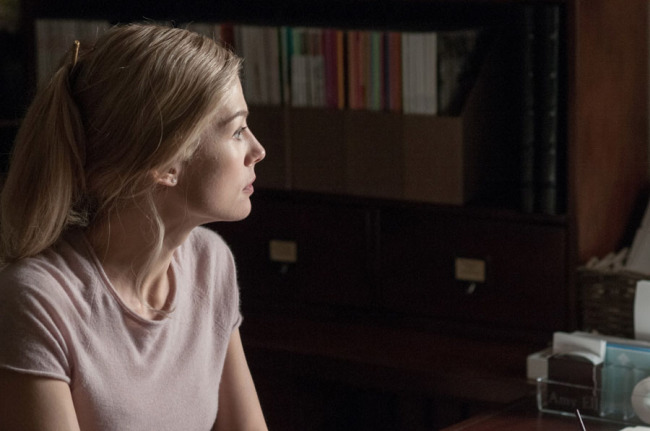Warning: spoiler alert!
Gillian Flynn’s film adaptation Gone Girl has taken the term “feminist,” “misogynist” and “psychopath” to a whole new extreme.
Flynn pairs two characters together that could not be more opposite. Nick, a country-raised man who loves boobs, beer and football falls in love with Amy, a born-and-bred New Yorker who has been raised by elite and wealthy authors. With writing being their “common ground,” the two embark on a marital journey together.
Trouble soon follows.
A couple is years into their marriage and along with a series of unfortunate events straining their marriage, they both become unhappy.
While Nick chooses to ignore the problems and drowns his sorrows in his mistress’ oversized breasts, Amy decides to plot revenge against her husband.
She fakes her own death.
In this unfathomable, deranged and downright insane plan of Amy’s, she meticulously calculates every step to ensure Nick would be the number one suspect.
And she almost succeeds.
However, with the media being used as the main platform of judgment, Nick quickly learns that he must win over radio and TV viewers in order to persuade the public he is in the clear.
He also figures out that his wife has schemed her own homicide, which leads to a fire-fighting-with-fire fight between the two trying to win over the public through manipulation, lying and intense hyperbole.
The two are compatible in wits and charm; but, Amy, in my opinion, wins with her psychotic mind that’s able to dress and look chic throughout the entire process (disregarding her runaway attire).
What also won me over to empathize (to a certain extent) with this character was her monologue.
She addresses a surprisingly relatable and relevant issue regarding women changing themselves for the men they like in order to seem like the Cool Girl. She emphasizes how the Cool Girl “unabashedly love sex and drinking beer and eating burgers- while still miraculously maintaining a perfect figure- and is always ready to forgive her husband’s foible.”
Amy continues her speech for a few minutes in the film. The following is an excerpt:
“That night at the Brooklyn party, I was playing the girl who was in style, the girl a man like Nick wants: the Cool Girl. Men always say that as the defining compliment, don’t they? She’s a cool girl. Being the Cool Girl means I am a hot, brilliant, funny woman who adores football, poker, dirty jokes, and burping, who plays video games, drinks cheap beer, loves threesomes and anal sex, and jams hot dogs and hamburgers into her mouth like she’s hosting the world’s biggest culinary gang bang while somehow maintaining a size 2, because Cool Girls are above all hot. Hot and understanding. Cool Girls never get angry; they only smile in a chagrined, loving manner and let their men do whatever they want. Go ahead, sh*t on me, I don’t mind, I’m the Cool Girl.”
I clearly remember this portion in the movie. Prior to her speech, I had categorized her literally as the cool and carefree guys’ girl who contradicts her conservative and preppy upbringing.
To now hear that she had been putting on a façade for the first few years of their marriage in order to solidify Nick’s love for her was astonishing.
It left me in awe.
She had effortlessly put into words a problem with women that even I have done.
It is something that we should have to do, or need to do, yet, we feel the pressure to do it and decide to do it anyways.
And we hate ourselves for it later.
“It” is pretending to be someone else at the beginning of the relationship, as I stated before. More specifically, that “someone else” is contouring your body and personality to fit the description of your new boyfriend’s ideal girl.
It’s not hard to figure out. The first few dates are basically describing every physical turn on, turn off, likes and dislikes in human beings. But what women do, or tend to do, is take that information, mentally store it for later, and consciously or not, we act more like that Cool Girl Amy refers to.
We pretend to care for a sport we may not have given one f*ck about before so we can spend time watching the game with our “bae.” We wear more sexually appealing clothing. We shotgun that beer when out with the “boys” even though all we want is a vodka cranberry or a margarita on the rocks.
It’s an understandable habit to have.
When you like someone new, you want him or her to like you too. You tweak yourself just a little bit so that they will see you in a more favorable light.
This problem is not subjected to women only.
Men do this too.
In the beginning, men act like your Prince Charming, here to swoop you in his arms and be that caring, loving, fun and open communicating boyfriend every woman dreams about.
That becomes short-lived too.
Like the movie, Nick stops making an effort, and puts his own priorities before his marriage. He even stops communicating with her by not responding to messages or even her voice when she calls in the house.
The truth behind this is that you cannot put on your “best face” for that long. Especially in a marriage.
You should also not try to stage your own death and frame your husband.
Just be yourself.
If the characters in Gone Girl had, Nick wouldn’t have married a psychopath, Amy wouldn’t have wasted her time on a misogynist cheater, and Neil Patrick Harris would be alive.














